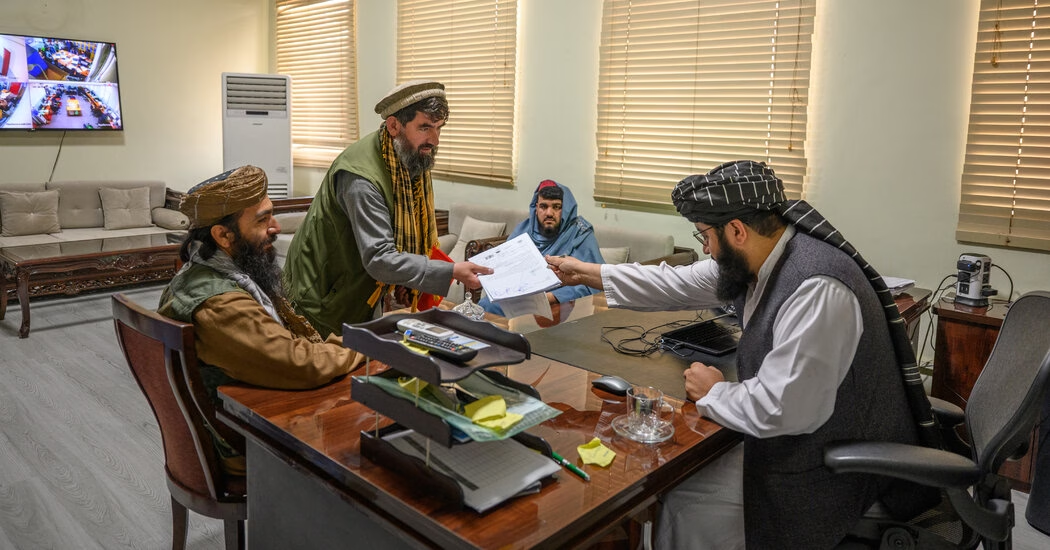He is known as the Taxman of Kabul, a bearded, black-turbaned Talib with a friendly demeanor and the analytical skills of a computer-savvy accountant.
As the head of the Taliban’s Taxpayers Services Directorate, Abdul Qahar Ghorbandi has the challenging task of raising revenue for the government of an extremely poor, isolated country.
From his position behind a massive desk next to a black and white Taliban flag, Mr. Ghorbandi oversees hundreds of Afghan taxpayers daily. He ensures they come with income documentation and leave with a handful of tax forms to fill out.
Teachers, money changers, truckers, wedding planners, grocers, and others frequent the worn hallways of the tax building, discussing their taxes with Talibs typing on computer terminals.
The Taliban have been intensifying tax collection after a significant economic contraction following their takeover in 2021. The regime, now in power, has been hindered by sanctions, partly due to its harsh restrictions on women and girls.
Aid from the United States, significantly reduced since 2021, may be entirely halted under President Trump’s budget cuts. This aid has been directed to the United Nations and non-governmental organizations operating in Afghanistan, rather than to the Taliban government itself.
With the Taliban’s return to power, former insurgent fighters now act as bureaucrats, working side by side with employees from the U.S.-backed government they replaced, within the 280-person tax department.
“We have people with turbans, beards, sitting next to those in suits,” said Mohammad Walid Haqmal, the spokesperson for the Ministry of Finance.
Mr. Ghorbandi himself, the Taxman, was a clandestine operative for the Taliban in Kabul before transitioning to a civil servant, as he claimed.
Mr. Ghorbandi, a master’s degree holder in computer science, oversees a tax administration computer system that has been translated into Pashto and Dari. He has recruited IT experts to modernize the department.
He has also made efforts to promote transparency, he said, as he took a break for a meal of beef kebabs and rice. His employees are prohibited from handling cash. Taxpayers take their forms to a government-operated bank to make their payments.
When not at his desk signing off on documents brought by aides rushing in and out, he said he visits different parts of his department, asking taxpayers how the process could be expedited.
International observers note that the Taliban have decreased the tax corruption and cronyism that Afghans associated with the U.S.-aligned government, while also streamlining tax collection.
Though many affluent Afghans previously evaded taxes, Mr. Ghorbandi stressed that he, as the government Taxman, was not exempt. He stated he pays 30,000 afghanis monthly, roughly over $400.
Yet, despite being efficient and open, it remains a tax office, and not all taxpayers leave satisfied.
Shamsurahman Shams, who arrived one day late last year, had a grievance with the Taxman. He claimed the two private schools he managed had not been profitable for three years, and he carried a folder holding documents to prove it. However, he was assessed 500,000 afghanis, approximately $7,350, in taxes.
He engaged in a spirited but civil discussion with a department employee, presenting his documents. There was no resolution, and he was advised to return later to continue negotiations.
Although not the outcome he desired, Mr. Shams acknowledged that the new system was clearer than what came before. “At least they listened to me,” he said.
During the war, the Taliban maintained a lucrative tax system, instituting customs duties, trucking fees, and local taxes in regions under their control. They also earned millions by imposing 10 percent taxes — “ushar” in Islam — on poppy farmers, although they have since prohibited poppy production.
In 2023, the Taliban government collected about $3 billion in taxes, customs, and fees, equivalent to 15.5 percent of the gross domestic product (the comparable rate in the United States is 25.2 percent). Customs duties, mining revenues, telecom licenses, airport charges, and fees for national ID cards, passports, and visas comprised the biggest sources of revenue for the Taliban, according to the World Bank.
Half of the government revenues were spent on security and the military last year, with just 26 percent allocated for social programs, mostly for boys’ education, according to international observers.
Mr. Ghorbandi stated the tax system was not designed to punish. Generous exemptions mean most ordinary Afghans are not required to pay income taxes. Shopkeepers with annual sales below two million afghanis, around $29,500, are also exempt.
Merchants earning above that amount are taxed at only 0.3 percent — a rate American conservatives might find appealing.
There are no cash penalties or interest fees for taxpayers who fail to pay on time. However, delinquent taxpayers can lose their business licenses and access to banking services.
“We are human,” Mr. Ghorbandi said. “We don’t want to burden our people.”
He and Mr. Haqmal, the Finance Ministry spokesperson, stated that the ultimate goal is to eliminate all income taxes.
“It is a direct order from our supreme leader,” Mr. Haqmal said, referring to Sheikh Haibatullah Akhundzada, the Taliban’s emir and head of state. “He said: ‘I need a tax-free Afghanistan.’”
Another directive from Sheikh Haibatullah has been the drastic reduction of women’s rights and broader restrictions on civil liberties for all Afghans. Women are prohibited from traveling without a male relative and are obligated to cover their bodies and faces in public. The sound of a woman’s voice outside her home is banned.
A notable aspect of the tax department’s 15 sections in Kabul is the presence of female taxpayers in rooms filled with men.
Lida Ismaeli, who runs a private school, sat next to a Talib with a beard as he looked over her tax status on a computer. She stated no one complained about her speaking with a male employee about her taxes without a male relative present.
Under the previous government, Ms. Ismaeli said, she was uncertain if her taxes went to the government or into the pocket of the employee she paid.
“The system is better now — it’s more fair,” she said.
In a dim hallway, Mohammad Taqi Irfani, a money changer, reviewed his tax assessment with an employee. Mr. Irfani seemed resigned to his tax payment of 73,500 afghanis, or about $1,080, on his annual earnings.
He stated he did not enjoy paying taxes, but his tax obligation was clearly explained, and his business accounts were not questioned. Under the American-backed government, he said, tax collectors visited his office and demanded bribes to lower his assessment.
“They were in it just to make money for themselves,” he said. “So far under this government, no one has asked me for a bribe.”
Safiullah Padshah and Yaqoob Akbary contributed to this report.
Source: https://www.nytimes.com/2025/03/09/world/asia/afghanistan-taliban-economy.html




